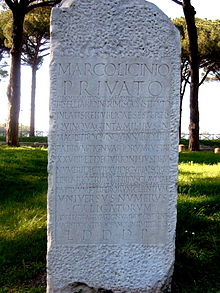
Back Collegium Catalan Collegium (Rom) German Collegium Spanish کولگیوم (روم باستان) Persian Collegium French קולגיום HE Կոլեգիաներ Armenian Collegium Italian Collegium Dutch Colégio (Roma Antiga) Portuguese

A collegium (pl.: collegia) or college was any association in ancient Rome that acted as a legal entity. Such associations could be civil or religious. The word collegium literally means "society", from collega ("colleague").[1] They functioned as social clubs or religious collectives whose members worked towards their shared interests. These shared interests encompassed a wide range of the various aspects of urban life; including political interests, cult practices, professions, trade, and civic services.[2] The social connections fostered by collegia contributed to their influence on politics and the economy; acting as lobbying groups and representative groups for traders and merchants.[3]
Some collegia were linked to participating in political violence and social unrest, which resulted in the suppression of social associations by the Roman government.[4] Following the passage of the Lex Julia during the reign of Julius Caesar as Consul and Dictator of the Roman Republic (49–44 BC), and their reaffirmation during the reign of Caesar Augustus as Princeps senatus and Imperator of the Roman Army (27 BC–14 AD), collegia required the approval of the Roman Senate or the Emperor in order to be authorized as legal bodies.[5]
- ^ "college". Merriam-Webster.com Dictionary. Merriam-Webster. "from Latin collegium society, from collega colleague"
- ^ Verboven, Koenraad (2011). "Introduction: Professional Collegia: Guilds or Social Clubs?". Ancient Society. 41: 187–195. JSTOR 44079950.
- ^ Verboven, Koenraad (2011). "Introduction: Professional Collegia: Guilds or Social Clubs?". Ancient Society. 41: 187–193. ISSN 0066-1619. JSTOR 44079950.
- ^ Meiggs, Russell (1973). Roman Ostia. Clarendon Press. pp. 311–312. ISBN 978-0-19-814810-4.
- ^ Cite error: The named reference
de Ligt 2001was invoked but never defined (see the help page).